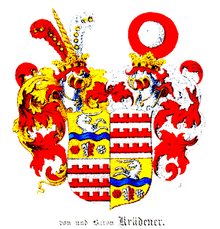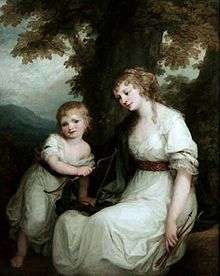Pavel Kridener
| Pavel Alekseevich Kridener | |
|---|---|
|
Painting of Pavel (left) with his mother in 1786, aged 2 | |
| 4th Russian Ambassador to United States | |
|
In office 1827–1837 | |
| President | czar Nicholas I of Russia |
| Preceded by | Fyodor van Tuyll van Serooskerken |
| Succeeded by | Alexander Bodisko |
| Personal details | |
| Born |
January 31, 1784 St. Petersburg |
| Died |
January 29, 1858 Bern |
| Nationality | Russian |
| Spouse(s) | Amalie von Lerchenfeld |
| Children | Nikolai-Arthur |
| Profession | Diplomat |
Paul Ludwig von Krüdener (Russian: Павел Алексеевич Криденер (Pavel Alexeevich Kridener); January 31, 1784 – January 29 1858, Kosse) was a Russian diplomat. He was the fourth Russian Ambassador to the United States, under John Quincy Adams.[1][2]
Biography

Pavel Kridener was born on January 31, 1784, in St. Petersburg, Russia. He was the son of the famous Barbara von Krüdener, a Baltic German mystic and author. His father was Baron Bourkhardt-Alexis-Constantine Krüdener, with whom Barbara did not have a good relationship. Pavel was baptized Paul in honor of Grand Duke (later Emperor) Paul I of Russia (Russian: Па́вел I Петро́вич), his godfather. His father was appointed by Catherine the Great as Ambassador to the Republic of Venice in 1785, and Pavel spent the first two years of his life there. He subsequently followed his father's assignments in Munich until 1787, Copenhagen until 1794 and finally Madrid until 1800. His father was then appointed by Paul I as Ambassador to Prussia, under Frederick William III of Prussia. Friedrich Ancillon, a prominent Prussian historian, became his tutor.
Paul von Krüdener became chargé d'affaires and embassy secretary in 1804 to Paris, France. He was arrested in Strasbourg by Napoleon I in 1812 on suspicion of conspiracy. In 1817 he went to Bern, where he invited his mother. It was in Bern that he married Margarethe König (1798-1859), the mother of his four children.
Pavel Kridener was appointed Ambassador to the United States in 1827 and served until 1837 under John Quincy Adams. He was then transferred to Switzerland where he represented Russia's interests until his death.
